

In a city where coffee flows like rainwater and “Seattle Freeze” remains the social phenomenon most residents simultaneously deny and embody, Seattle’s board game scene has flourished with characteristic Pacific Northwest thoughtfulness. When winter darkness descends before your workday ends or summer sunshine creates moral obligations to be outdoors doing something—anything—”productive,” gathering in wood-paneled sanctuaries to push wooden pieces across colorful boards becomes less hobby and more essential mental health preservation. Let’s explore the cardboard havens scattered across Seattle’s distinctive neighborhoods, where the city’s legendary passive-aggressiveness paradoxically dissolves over lengthy European-designed strategy games.
With a comprehensive approach to gaming culture that rivals Seattle’s approach to coffee options, Zulu’s has carved out its distinctive niche in Seattle’s gaming ecosystem through careful attention to both product selection and community building.
Rather than attempting to be everything to everyone, they’ve created an experience specifically optimized for gaming communities—addressing practical concerns like tournament structure, trading opportunities, and proper illumination that can make the difference between immersive gaming experience and physical discomfort disguised as entertainment.
Their approach acknowledges that while games themselves provide the primary draw, surrounding community factors significantly impact overall experience quality. This attention to seemingly minor details creates an environment where sessions routinely extend hours beyond initially planned durations—not because patrons lose track of time (though they often do) but because continuing feels more appealing than leaving.
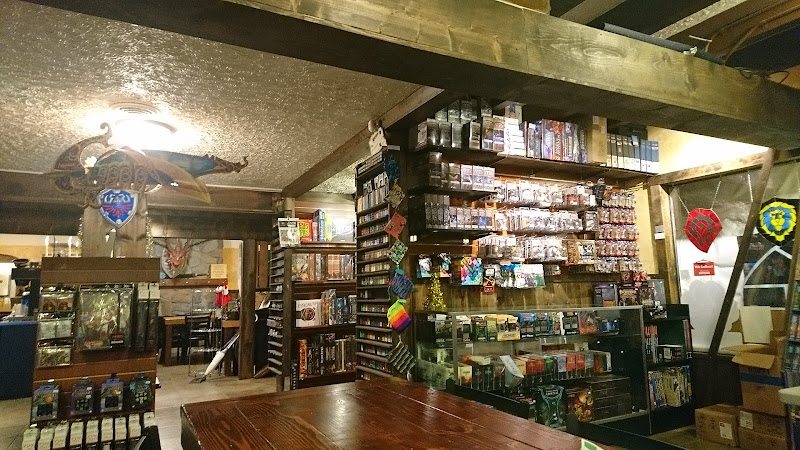
Spreading strategic enlightenment across Seattle with the same ambitious expansion as a certain local coffee chain (but with considerably more dice), Mox Boarding House has established itself as the closest thing Seattle has to a board gaming cathedral.
Their impressive physical space acknowledges the fundamental truth that even the most enthusiastic gaming deserves proper atmospheric support. By creating an environment that feels simultaneously impressive and welcoming, they’ve developed an institution that appeals to casual and dedicated gamers alike.
Their restaurant integration transforms what could be merely transactional retail into genuine community hub. The casual observer might initially mistake the focused silence of intense gameplay for typical Seattle standoffishness, but closer observation reveals the distinctive pattern of community formation: strangers becoming acquaintances over borrowed dice, acquaintances becoming friends over shared victories, and friends becoming chosen family through the crucible of cooperative campaign games.
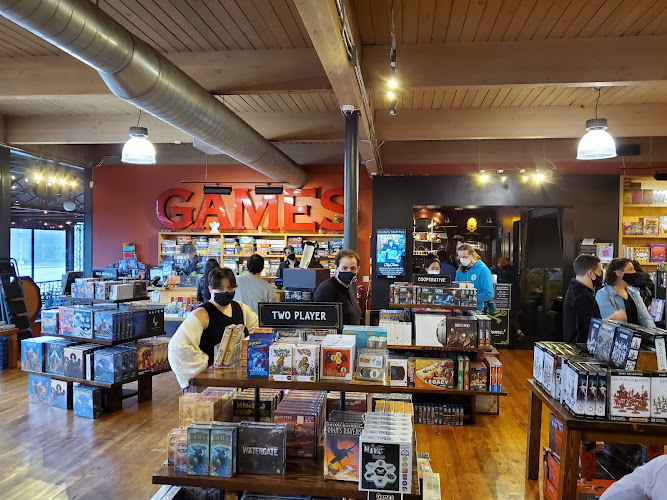
Established in West Seattle with the kind of determined commitment typically reserved for avoiding Interstate 5 during rush hour, Meeples Games brings gaming accessibility to a neighborhood separated from downtown by bridge-related anxiety and perpetual construction.
Their successful integration into West Seattle’s community fabric reflects the area’s characteristic independence—creating experiences that serve local residents while remaining worth the journey for visitors willing to brave the often temperamental West Seattle Bridge.
While offering plenty of open gaming opportunities, Meeples distinguishes itself through its commitment to accessibility across experience levels. Their approach has introduced countless Seattle residents to strategic thinking through gameplay, creating generations of gamers who understand that “game night” can involve substantially more sophisticated experiences than rolling dice and moving around a monotonous track.
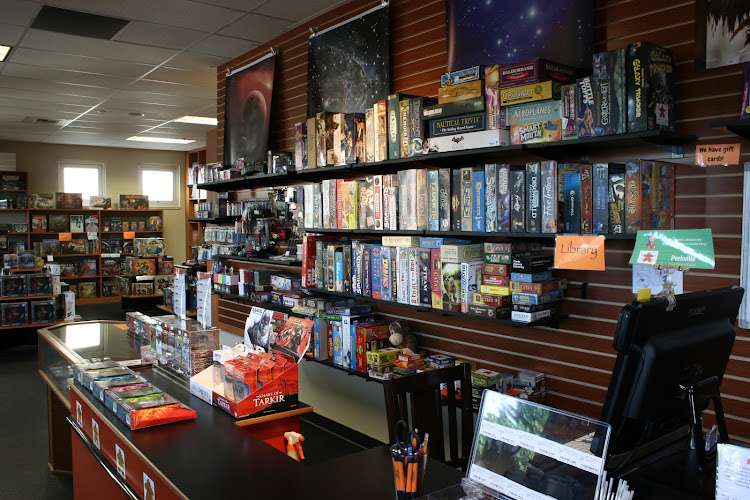
Established with adult beverage integration as explicit differentiation rather than merely implied benefit, Around the Table transforms gaming from daytime activity into evening entertainment through deliberate programming and thoughtful beverage pairing.
Rather than assuming community will naturally emerge from proximity (the “if you build it, they will come” philosophy that dooms many gaming venues), they actively facilitate connections through structured events, introductions, and programming specifically designed to integrate newcomers.
Their success in creating a diverse gaming community reflects Seattle’s distinctive social ecosystem where connections form around shared interests rather than demographic similarities. By emphasizing inclusivity as core value rather than marketing buzzword, they’ve created a space where the traditional barriers to gaming participation—expertise intimidation, social anxiety, group formation challenges—are actively addressed rather than merely acknowledged.
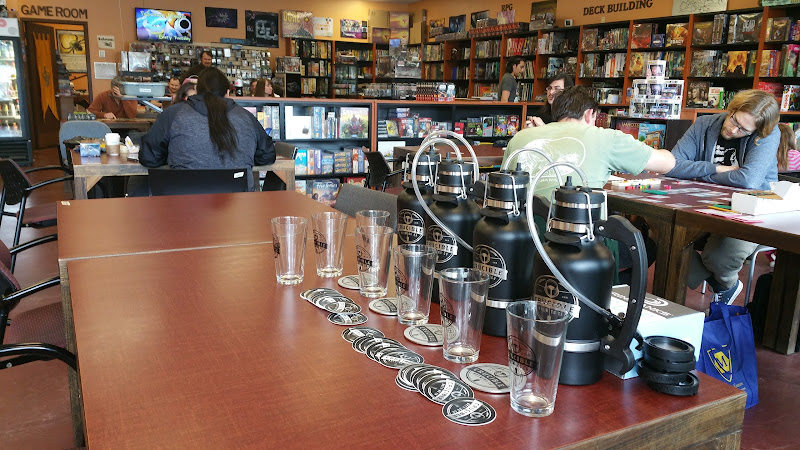
Fitting snugly into Seattle’s urban landscape like the perfect tile in Azul, The Missing Piece has established itself as exactly what its name suggests—the element Seattle’s gaming community didn’t realize was incomplete until it appeared.
The Missing Piece has mastered the delicate Seattle alchemy of creating community where social hesitation typically prevails. Their thoughtfully designed space provides a sanctuary where the city’s characteristic reserve mysteriously evaporates, creating temporal anomalies where “just one quick game” somehow consumes entire afternoons. The café’s welcoming environment ensures a steady flow of both enthusiastic newcomers and battle-hardened strategy veterans, creating a uniquely Seattle melting pot of gaming experiences.
What distinguishes The Missing Piece isn’t just their game selection but their continued excellence in fostering connections through shared experiences. They’ve maintained their position as an essential Seattle destination through dedication to creating community rather than just selling coffee alongside rentable entertainment—embodying the Seattle principle that authenticity matters more than marketing.
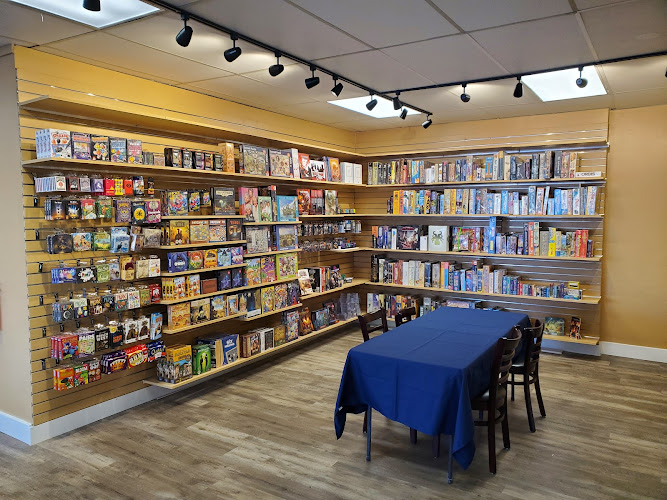
Named with knowing appreciation for sci-fi culture, Raygun Lounge has established itself as a sanctuary where gaming transcends mere entertainment to become legitimate lifestyle, combining elements of dive bar ambiance with geek culture celebration.
Their thoughtful integration of various gaming formats acknowledges that strategic thinking takes many forms—and that sometimes those forms involve vigorously slapping pinball flippers as counterpoint to moving wooden resources between game board territories.
Their space creates an environment where gaming newbies can discover entry points while veterans find challenges worthy of their expertise. This careful balance of accessibility and depth mirrors Seattle itself: initially overwhelming but ultimately rewarding to those willing to invest the time to discover its treasures.
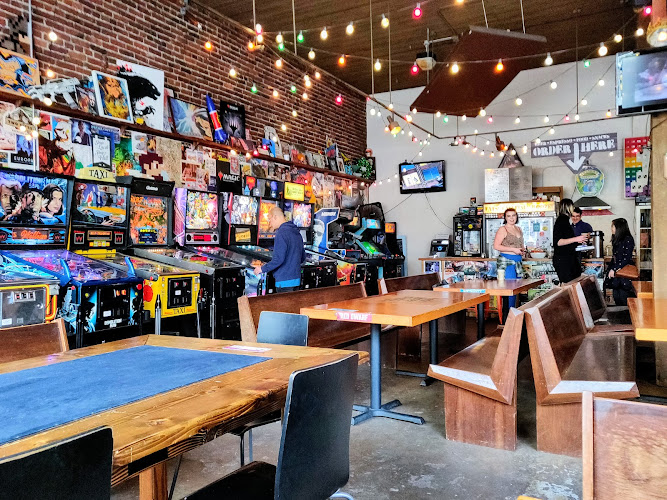
Despite a name suggesting precise mathematical calculation, The 15% has established itself in Seattle as a beginning—specifically, the beginning of countless gaming journeys, relationships formed over shared tables, and communities connected through collaborative play.
Their space prioritizes functionality over Instagram aesthetics, creating an environment where the focus remains firmly on gameplay rather than backdrop. This refreshingly substance-over-style approach feels increasingly revolutionary in a city where even convenience stores now feature carefully curated design elements and locally sourced lighting fixtures.
Their approachable implementation of gaming culture creates a space where enthusiasm matters more than experience level. Whether you’re a tournament regular with meticulously protected card sleeves or someone who just wandered in seeking shelter from characteristic Seattle precipitation, the welcome feels equally genuine—a minor miracle in a city where insider status often functions as social currency.
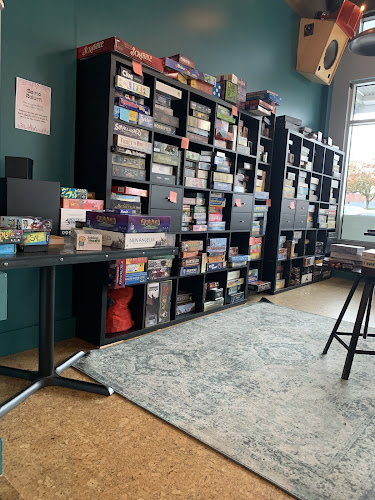
Seattle’s board game scene reflects the city itself: surprisingly diverse, thoughtfully curated, and perpetually explaining to outsiders that there’s more to it than coffee and tech bros. These gaming venues have created micro-communities in a metropolitan area where “Which neighborhood do you live in?” functions as primary social sorting mechanism and cross-bridge friendships are maintained with the dedication normally reserved for long-distance relationships.
What distinguishes Seattle’s gaming landscape is its accessibility—both literally (most venues are reachable by public transportation, assuming it’s running on schedule) and figuratively (the communities welcome newcomers with authentic enthusiasm rather than suspicious gatekeeping). Whether you’re a serious gamer with a collection that requires its own climate-controlled storage unit or someone who still thinks Monopoly represents the height of board game sophistication, Seattle offers spaces where you can find your people.
The varied landscape of dedicated venues has created a tight-knit community where faces become familiar across locations, and recommendations travel faster than news of new craft brewery openings. Regular patrons develop relationships that transcend the gaming table, forming bonds over shared experiences like debating optimal worker placement strategies, collectively enduring traffic apocalypses, and united in their passionate opinions about which venue truly offers the best gaming tables in the city.
As Seattle continues its perpetual evolution, the board game scene serves as microcosm of what makes the city work: innovative excellence, genuine community, and the stubborn belief that meaningful connections still happen best in person, over shared tables and borrowed dice, preferably with a locally roasted coffee or craft beer within reach.
So whether you’re a lifelong Seattleite who remembers when Amazon only sold books, a recent transplant still adjusting to the concept of nine months of gray skies, or just passing through on your way to somewhere supposedly more exciting, the board game scene offers something uniquely Seattle—a place where community forms around shared experiences, where strangers become friends over tactical discussions, and where the only thing more welcome than a new player is a new player who brings pastries from that place everyone’s been talking about.
After all, in true Seattle fashion, these venues exist as islands of focused engagement in a city defined by passive avoidance and precipitation, proving that sometimes the most meaningful connections happen offline, one dice roll at a time, in a city that contains multitudes with remarkable restraint.
